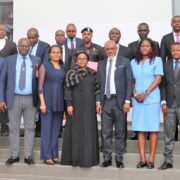EFCC Tells Banks To Probe Customers’ Sources Of Income

The Economic and Financial Crimes Commission has asked banks to investigate the sources of income of their customers.
The EFCC chairman, Abdulrasheed Bawa, stated this on Tuesday when members of the Association of Chief Audit Executives of Banks in Nigeria paid him a courtesy visit in Abuja.
Bawa stated that some customers received a huge sum of money within two months of opening an account.
“I will like to urge you to know your customers, know the kind of businesses they do before opening an account for them because some customers will open an account within a space of two months a huge sum of money is found in the account, so there is need for you to try and query this information including their linked accounts,” he said.
The EFCC said the anti-graft agency will start holding banks liable for fraud in financial deposits, where there are established cases of complicity in the sector from September 1.
“Bawa implored the bank auditors to take issues of transparency in banking operations seriously, adding that starting from September 1, 2021, it will no longer be business as usual as the commission will hold banks liable where there are established cases of institutional complicity in fraud in the sector,” the EFCC chief was quoted in a statement.
The vice-chairman of the association, Uduak Udoh, said some customers are conniving with bank staff to loot funds while seeking support from the commission.
“Some customers are conniving with bank staff to loot funds. We want you to look into that area, not only the banks as we are ready to give you all the cooperation you need; we want you to trust bank auditors with information sharing because we cannot support fraudulent staff as they are a threat to the organization,” he added.
Meanwhile, the anti-graft agency had once asked bank employees to declare their assets, as a part of efforts to check the role of bankers in keeping funds acquired illegitimately.
Lawyard is a legal media and services platform that provides enlightenment and access to legal services to members of the public (individuals and businesses) while also availing lawyers of needed information on new trends and resources in various areas of legal practice.













